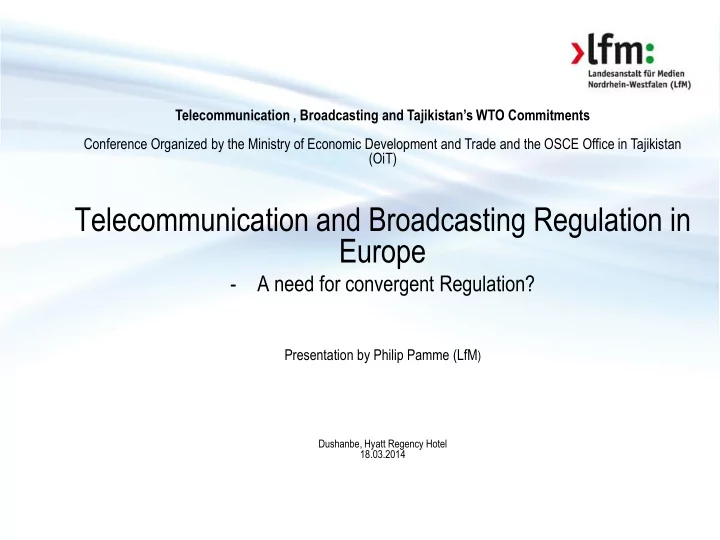

Telecommunication , Broadcasting and Tajikistan’s WTO Commitments Conference Organized by the Ministry of Economic Development and Trade and the OSCE Office in Tajikistan (OiT) Telecommunication and Broadcasting Regulation in Europe - A need for convergent Regulation? Presentation by Philip Pamme (LfM ) Dushanbe, Hyatt Regency Hotel 18.03.2014
Agenda 1. Introduction 2. Converging Media 3. A need for regulation 4. Independent regulation 5. Media Convergance = Convergent Regulator? 6. Conclusion
1. Introduction • The Media Authority of North-Rhine Westphalia (LfM) • Responsible for regulatory issues concerning private broadcasting in the Federal State of North-Rhine Westphalia • Financed from broadcasting fees • Legal entity under public law Tasks : Authorisation / Licensing Monitoring / Controlling Information / Consultation Promotion / Qualification Research / Support
2. Converging Media a. Technical perspective A progressive merger of different technologies which can be used via one single device (e.g. Smartphone, Connected TV, etc.) The audiovisual and the telecommunications sector (electronic communications) are extremely intertwined b. Consumer perspective New forms of communication (social networks, Video-on-Demand, Voice over IP, etc.) The consumer no longer consumes content but also creates content (e.g. youtube, blogs, etc) c. Legal perspective Different regulated areas on one screen (linear vs. non-linear content) Data protection issues
3. A need for regulation • Telecommunications sector • In the Telecommunications sector the need for regulation is mainly driven by the aim of creating/securing a competitive market • The reference paper of the WTO regards a regulatory entity as a „(…) crucial factor in the liberalisation of telecommunications services (…)“ 1 • => The regulator should act as a referee • Legal sources: WTO Reference Paper, EU Framework Directive 2 , etc. 1“ Exploring the Reference Paper on Regulatory principles “ by Boutheina Guermazi, http://www.wto.org/english/tratop_E/serv.../guermazi_referencepaper.doc 2 DIRECTIVE 2002/21/EC OF THE EUROPEAN PARLIAMENT AND OF THE COUNCIL of 7 March 2002 on a common regulatory framework for electronic communications networks and services (Framework Directive)
3. A need for regulation • Audiovisual services sector • Need for regulation in the audiovisual services sector is mainly driven by the aim of securing media pluralism, freedom of expression, but also by securing/creating a competitive market. • Moreover, the audiovisual media sector needs adequate access to spectrum as it is a finite resource • Legal sources: Recommendation Rec(2000)23 Committee of Ministers to Member States (Council of Europe) 3 , Art. 10 ECHR (European Convention on Human Rights) 4 , Art. 19 International Covenant on Civil and Political Rights 5 , Recital 5 of the AVMS (EU Audiovisual Media Services Directive) 6 , etc. 3 http://www.coe.int/t/dghl/standardsetting/media/doc/cm/rec(2000)023%26expmem_EN.asp 4 http://www.echr.coe.int/Documents/Convention_ENG.pdf 5 http://www.ohchr.org/EN/ProfessionalInterest/Pages/CCPR.aspx 6 http://eur-lex.europa.eu/LexUriServ/LexUriServ.do?uri=OJ:L:2010:095:0001:0024:EN:PDF
3. A need for regulation • Instruments for regulatory authorities in both sectors: • Legal basis to: grant licences impose sanctions be involved in the planning and allocation of national spectrum resolve disputes between different parties
4. Independent regulation • In order to carry out the above mentioned tasks, the regulators of both sectors should be independent. • Every legal source that refers to the need for a regulator also stresses that this regulator should be independent! • => the regulator must be protected against too much influence from industry and state. • Criteria of independence 7 : a) Financial Autonomy b) Autonomy of Decision Makers c) Status & Powers d) Knowledge 7 EU Study: INDIREG Indicators for independence and efficient functioning of audiovisual media services regulatory bodies - a study conducted on behalf of the European Commission, http://ec.europa.eu/avpolicy/docs/library/studies/regulators/final_report.pdf
5. Media Convergence = Convergent Regulator? • Different approaches across Europe: Convergent Regulator responsible for Telecommunications and Broadcasting (e.g. Ofcom, UK or BAKOM, Switzerland) Separated Regulators, one for Broadcasting, one for Telecommunications (e.g. Media Authorities and Federal Network Agency (BNetzA), Germany) • The EU calls for cooperation in both sectors • Establishment of BEREC (Body of European Regulators for Electronic Communications) and ERGA (European Regulators Group for Audiovisual Media Services) • However, the decision about the structural design of the regulator (convergent regulator, or separate entities) is up to the Member States!
6. Conclusion • We live in a convergent world in which the boundaries between content (audiovisual media services) and infrastructure (telecommunications services) are blurring • Infrastructure as well as content both need a certain degree of regulation in order to fulfil their legal responsibilities, such as: the creation of a competitve market, or the promotion of media pluralism. • Regulation has to be based on a stable legal basis in order to be effective • In this context, the independence and impartiality of the regulator is essential • Media convergence does not mean that convergent regulation is compulsory • Regulators have to cooperate and strive for best practice solutions • The EU sets up legal frameworks which call for cooperation between regulators
Thank you very much for your attention!
Questions? ppamme@lfm-nrw.de
Recommend
More recommend